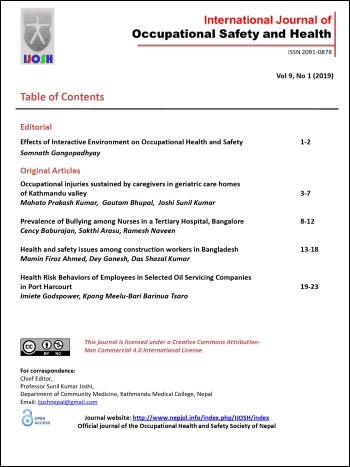Health Risk Behaviors of Employees in Selected Oil Servicing Companies in Port Harcourt
DOI:
https://doi.org/10.3126/ijosh.v9i1.25163Keywords:
Behaviours, Companies, Health, Oil-Servicing, RiskAbstract
Background: The recent rate of deaths of worker in the oil industry is alarming. However, the way managers of the workers handle the problem is even more worrisome. This study investigated the health risk behaviours of employees in selected oil servicing companies in Port Harcourt city, Nigeria.
Methods: The study adopted the purposive sampling technique to select three notable oil servicing firms in the area and then selected 175 workers of the 350 workers as target population. Questionnaires were used to elicit information regarding the subject matters from the respondents. Data generated were presented in tables, while percentages were used as a yardstick for conclusions.
Results: Findings showed that most of the respondents exceeded driving speed limit (73.6%), do not get enough rest (84.9%), alcohol consumption (76.1%), cannot manage their individual stress (75.9%), having more than one sexual partners (74.8%). Also noted in the study is that most workers do not maintain low sugar diet (65.6%), do not take adequate fruits/vegetables (54.1%), do not get adequate sleep (54.6%), regular exposure to sun (58.5%), not coping with work stress (59.2%) and not socializing with friends (56%).
Conclusions: As a result of these findings, it was recommended that, there is need for supervisors of the workers to engage the workers in round table discussions that will ease the stress and psychological imbalance of the workers, the supervisors are advised at the instant of this research, to institute periodical exercises for workers to keep them fit and encourage healthy living, finally, there is need for awareness campaign by the companies for the purpose of re-orienting the workers on the need to practice with safety always.
Downloads
Downloads
Published
How to Cite
Issue
Section
License
This license enables reusers to distribute, remix, adapt, and build upon the material in any medium or format for noncommercial purposes only, and only so long as attribution is given to the creator.





